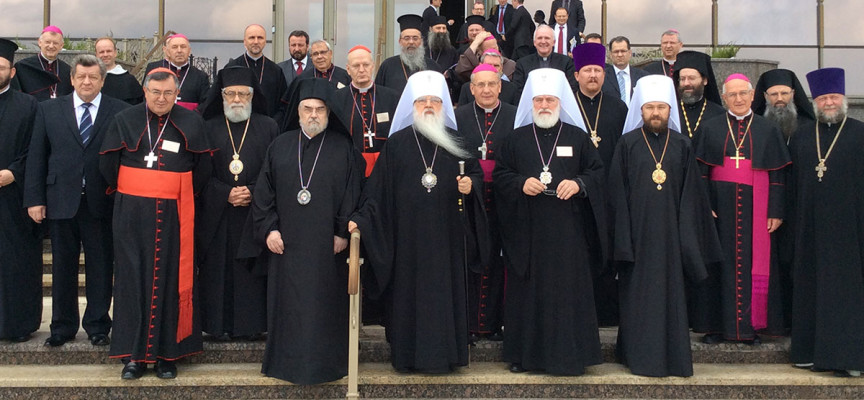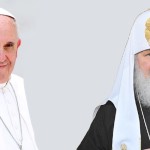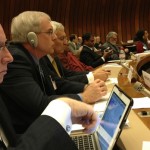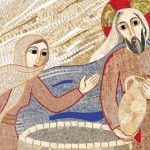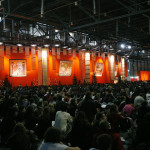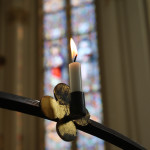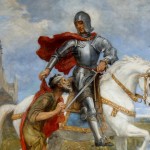A message in nine points was born in Minsk, Bielorussia, where the IV Catholic-Orthodox Forum took place from 2 to 6 June 2014. “Religion and Cultural Diversity: Challenges for the Christian Churches in Europe” was the general theme of the meeting, which gathered 35 representatives of the orthodox churches in Europe and of the catholic bishops conferences, from 22 European countries. The Forum opened with a prayer for peace in Europe and the Ukraine in the crypt of Minsk’s Memorial Church of All Saints and Innocent Victims in the Motherland. It was co-chaired by Metropolitan Gennadios of Sassima of the Ecumenical Patriarchate and Cardinal Peter Erdő, Archbishop of Esztergom-Budapest, President of the Council of the Bishops’ Conferences of Europe (CCEE). The Ecumenical Patriarch Bartholomew, Pope Francis and Patriarch Cyril of Moscow and All Russia sent messages to the participants. The full text of the message follows.
Message of the IV Catholic-Orthodox European Forum
Minsk, Belarus, 2 to 6 June 2014
1. The theme, “Religion and cultural diversity: challenges for the Christian Churches in Europe”, was chosen in response to a request coming from our communities who feel strongly challenged by the on going cultural and moral shifts in Europe. Over the last twenty years, globalization on the world scale and secularization in European legislation on moral issues have raised questions that call for common answers. Our concern is growing also because we see that the process of estrangement between Europe and its Christian roots seems to be speeding up.
2. Our message wants to be first of all a sign of joy and hope for all those engaged in the mission of the Church. We share the life conditions of all Europeans in this economic and cultural crisis, and we know that many are suffering and are in search of a word that gives sense to their life. Indeed where Christian faith and morality have been dismissed, a feeling of emptiness leads many to despair and nihilism. The Church offers consistent values by incorporating humanity in Christ, the source of all true values. Thus, the Church calls the world to be transformed by prayer, worship and Christian witness.
3. We share with Europeans of today our conviction that Christian faith is the primary source for European culture and morality. Centuries of history witness both in the East and the West the extraordinary richness of cultural achievements in our continent through the contribution of Christian faith. Indeed faith has begotten culture and culture has been constantly challenged by faith. We pay tribute to the Christian heritage of Europe that shaped our worldview and gave moral principles to the peoples of Europe.
4. In their diversity European cultures have all drawn from common Christian roots. As in other cultural contexts, we must recognize that a considerable part of human cultures relies on religious inspiration. Christian anthropology has deeply impacted on European culture. Recognising God as Creator does not annihilate human reason but rather brings it closer to the Truth. Christianity never opposes reason and faith. God is the eternal Reason that creates all that exists. In revealing Himself he has not eliminated but rather has affirmed human intelligence. The highest contribution of Christianity to human history is precisely the alliance between faith and reason that produced the vision of the dignity of each human person, the need for freedom and solidarity, and openness to the mystery of our existence.
5. We stress that Christian faith guarantees rather than takes from our quest for freedom and happiness. Christian faith means total acceptance of Jesus-Christ present in his Church through the Holy Spirit. “For God so loved the world, that he gave his only Son” (John 3:16). Therefore, Christ is not a product of human cultures. As God incarnate, He challenges human history and human cultures. Our Christian Churches bear witness to the coming of Christ as an event in the cultures of our peoples. Faith in Christ does not abolish human diversity. It enriches and promotes the elements of truth and goodness already present in human cultures.
6. Our Christian Churches of the East and the West do not fear cultural diversity. Since its foundation, the Church was culturally pluralistic. There were different cultural approaches among the disciples of Christ, for instance between those who spoke Aramaic and those who spoke Greek. “There are diversities of gifts, but the same Spirit” (1Co 12:4). Christianity proclaims Christ’s Gospel in the variety of human cultures.
7. Religious freedom is an essential element of Christian faith. For us religious freedom means the freedom to search for and adhere to the truth. It is based not on the subjective attitude of an individual or a group, but on the transcendent dignity of each human person made for the Absolute, for Truth and for God. Legislation that promote religious indifference, relativism or syncretism even in terms of tolerance tends to reduce to the private sphere a right that is fundamental to the person’s dignity. Fostering religious freedom means for Christian Churches entering into ecumenical dialogue without proselytism nor fundamentalism nor moral permissiveness.
8. The contemporary gap between Christianity and main stream mentality has serious consequences for the future of Europe’s institutions and life. Today for many Europeans there are no longer stable reference points to shape their moral conduct and appreciate what is right and what is wrong, as they live under the will of the “sovereign autonomous Self”. Individualism leads to moral relativism. There is no consideration for an objective truth nor a common good. The gap between the Churches’ view of morality and the main postmodern trends lies in this: we are convinced that moral principles are inscribed by the Creator in the heart of all human beings, while in a postmodern context, morality is what one individually decides. We call on Europeans to recognize that the key to freedom is to accept that we receive ourselves from God, not that we can dispose arbitrarily of everything as if we were our own creators.
There is no opposition between Gospel principles and human values. Christianity means that all that is good and true in humanity is enveloped by the grace of Christ our Saviour. God humbled himself to our humanity not in order to cancel its potentialities, but to heal what was ill and bring our humanity to its perfection.
9. Faith and morality go together; culture and morality as well. We do not forget that the huge progress accomplished in European history in matters of human rights and protection of the weakest come from those principles that Christianity has brought to Europe. As pastors we want to continue to bring the best of our moral teaching to our people and as citizens to present it to our Governments and to the European Institutions. We are convinced that Christian communities are able to act as witnesses of what is good for all as they draw their inspiration from the Gospel of Christ.
In Christ, we find our inspiring source that renews us and brings us to a greater sense of responsibility in Europe and in the world today.
Un messaggio in nove punti è nato a Minsk, Bielorussia, dove il 2-6 giugno si sono svolti i lavori del IV Forum europeo cattolico-ortodosso. “Cristo, sorgente di rinnovamento e di speranza per l’Europa” il tema generale dell’incontro che ha visto riuniti 35 rappresentanti delle Chiese ortodosse presenti in Europa e di Conferenze episcopali di 22 Paesi del continente. A guidare i lavori – che si sono aperti con una preghiera per la pace in Europa e in Ucraina nella cripta della Chiesa-monumento di tutti i Santi e delle vittime innocenti della Madrepatria di Minsk – il Metropolita Gennadios di Sassima del Patriarcato ecumenico e il card. Péter Erdő, presidente del CCEE. Il Patriarca ecumenico Bartolomeo, papa Francesco e il patriarca Kirill di Mosca e di tutta la Russia hanno inviato messaggi ai partecipanti. Pubblichiamo il testo integrale.
Messaggio del IV Forum cattolico-ortodosso europeo
Minsk (Bielorussia), 2-6 giugno 2014
1. Il tema “Religione e diversità culturale: le sfide per le Chiese cristiane in Europa” è stato scelto in risposta ad una richiesta proveniente dalle nostre comunità, che si sentono fortemente chiamate in causa dai cambiamenti culturali e morali in corso in Europa. Negli ultimi vent’anni, la globalizzazione su scala mondiale e la secolarizzazione nella legislazione europea sulle questioni morali hanno sollevato interrogativi che richiedono risposte comuni. La nostra preoccupazione sta crescendo anche perché vediamo che il processo di allontanamento dell’Europa dalle sue radici cristiane sembra sia in fase di accelerazione.
2. Il nostro messaggio intende rappresentare, prima di tutto, un segno di gioia e di speranza per tutti coloro che sono impegnati nella missione della Chiesa. Condividiamo le condizioni di vita di tutti gli europei in questa crisi economica e culturale, e sappiamo che molti stanno soffrendo e sono alla ricerca di una parola che dia senso alla loro vita. Infatti, dove la fede e la morale cristiana sono state bandite, un senso di vuoto porta molti alla disperazione e al nichilismo. La Chiesa offre valori coerenti incorporando l’umanità in Cristo, la fonte di tutti i veri valori. La Chiesa, quindi, invita il mondo a lasciarsi trasformare dalla preghiera, dal culto e dalla testimonianza cristiana.
3. Condividiamo con gli europei di oggi la nostra convinzione che la fede cristiana costituisca la fonte primaria della cultura e della moralità europee. Secoli di storia testimoniano sia in Oriente sia in Occidente la straordinaria ricchezza delle conquiste culturali del nostro continente attraverso il contributo della fede cristiana. La fede, infatti, ha generato la cultura e la cultura è stata costantemente messa in discussione dalla fede. Rendiamo omaggio al patrimonio cristiano dell’Europa, che ha plasmato la nostra visione del mondo e ha dato dei principi morali ai popoli d’Europa.
4. Nella loro diversità, le culture europee hanno tutte attinto alle comuni radici cristiane. Come in altri contesti culturali, dobbiamo riconoscere che una parte considerevole delle culture umane si fonda su un’ispirazione religiosa. L’antropologia cristiana ha esercitato un’influenza profonda sulla cultura europea. Riconoscere Dio come Creatore non annulla la ragione umana, piuttosto la porta più vicina alla verità. Il cristianesimo non colloca mai in opposizione la ragione e la fede. Dio è la Ragione eterna che crea tutto ciò che esiste. Nel rivelare Se stesso, non ha eliminato, piuttosto ha affermato l’intelligenza umana. Il contributo più alto del cristianesimo alla storia umana è proprio l’alleanza tra fede e ragione, che ha prodotto la visione della dignità di ogni persona umana, il bisogno di libertà e di solidarietà, l’apertura al mistero della nostra esistenza.
5. Sottolineiamo che la fede cristiana garantisce anziché togliere qualcosa alla nostra ricerca di libertà e di felicità. La fede cristiana significa accettazione totale di Gesù Cristo presente nella sua Chiesa per mezzo dello Spirito Santo. “Dio ha tanto amato il mondo da dare il suo Figlio unigenito” (Gv 3, 16). Pertanto, Cristo non è un prodotto delle culture umane. Come Dio incarnato, Egli sfida la storia umana e le culture umane. Le nostre Chiese cristiane testimoniano la venuta di Cristo come evento nelle culture dei nostri popoli. La fede in Cristo non abolisce la diversità umana, al contrario arricchisce e promuove gli elementi di verità e di bontà già presenti nelle culture umane.
6. Le nostre Chiese cristiane d’Oriente e d’Occidente non temono la diversità culturale. Fin dalla sua fondazione, la Chiesa è stata culturalmente pluralista Ci sono stati approcci culturali diversi tra i discepoli di Cristo, per esempio tra coloro che parlavano aramaico e quelli che parlavano greco. “Vi sono diversità di carismi, ma uno solo è lo Spirito” (1 Cor 12, 4). Il cristianesimo proclama il Vangelo di Cristo nella varietà delle culture umane.
7. La libertà religiosa è un elemento essenziale della fede cristiana. Per noi la libertà religiosa significa libertà di cercare e di aderire alla verità. Non si basa sull’atteggiamento soggettivo di un individuo o di un gruppo, ma sulla dignità trascendente di ogni persona umana fatta per l’Assoluto, per la Verità e per Dio. La legislazione che promuove l’indifferenza religiosa, il relativismo o il sincretismo, anche in termini di tolleranza, tende a ridurre alla sfera privata un diritto che è fondamentale per la dignità della persona. Promuovere la libertà religiosa significa, per le Chiese cristiane, intessere un dialogo ecumenico senza proselitismo, né fondamentalismi, né permissivismo morale.
8. Il divario moderno tra il cristianesimo e la mentalità dominante ha gravi conseguenze per il futuro delle istituzioni e della vita in Europa. Oggi, per molti europei, non ci sono più punti di riferimento stabili che costituiscano un modello per la loro condotta morale e permettano loro di valutare ciò che è giusto e ciò che è sbagliato, poiché vivono assoggettati alla volontà dell’“Io autonomo sovrano”. L’individualismo conduce al relativismo morale. Non c’è nessuna considerazione per una verità oggettiva né per un bene comune. Il divario tra la visione delle Chiese in materia di morale e le principali tendenze postmoderne consiste in questo: noi siamo convinti che i principi morali sono iscritti dal Creatore nel cuore di tutti gli esseri umani, mentre in un contesto postmoderno, la morale è ciò che ognuno decide individualmente. Invitiamo gli europei a riconoscere che la chiave della libertà è accettare che riceviamo noi stessi da Dio, e non possiamo disporre arbitrariamente di ogni cosa come se fossimo i creatori di noi stessi.
Non c’è opposizione tra i principi del Vangelo e i valori umani. Il cristianesimo significa che tutto ciò che è buono e vero nell’umanità è avvolto dalla grazia di Cristo, nostro Salvatore. Dio si è umiliato per la nostra umanità non per annullare le sue potenzialità, ma per guarire ciò che era malato e portare la nostra umanità alla sua perfezione.
9. Fede e morale vanno insieme, così come cultura e morale. Non possiamo dimenticare che gli enormi progressi compiuti nella storia europea in materia di diritti umani e di tutela dei più deboli provengono dai principi che il cristianesimo ha portato all’Europa. Come pastori vogliamo continuare a portare la parte migliore del nostro insegnamento morale alla nostra gente, e come cittadini presentarla ai nostri governi e alle istituzioni europee. Siamo convinti che le comunità cristiane siano in grado di agire come testimoni di ciò che è bene per tutti, poiché traggono la loro ispirazione dal Vangelo di Cristo.
In Cristo troviamo la nostra fonte ispiratrice, che ci rinnova e ci porta ad un maggiore senso di responsabilità in Europa e n

